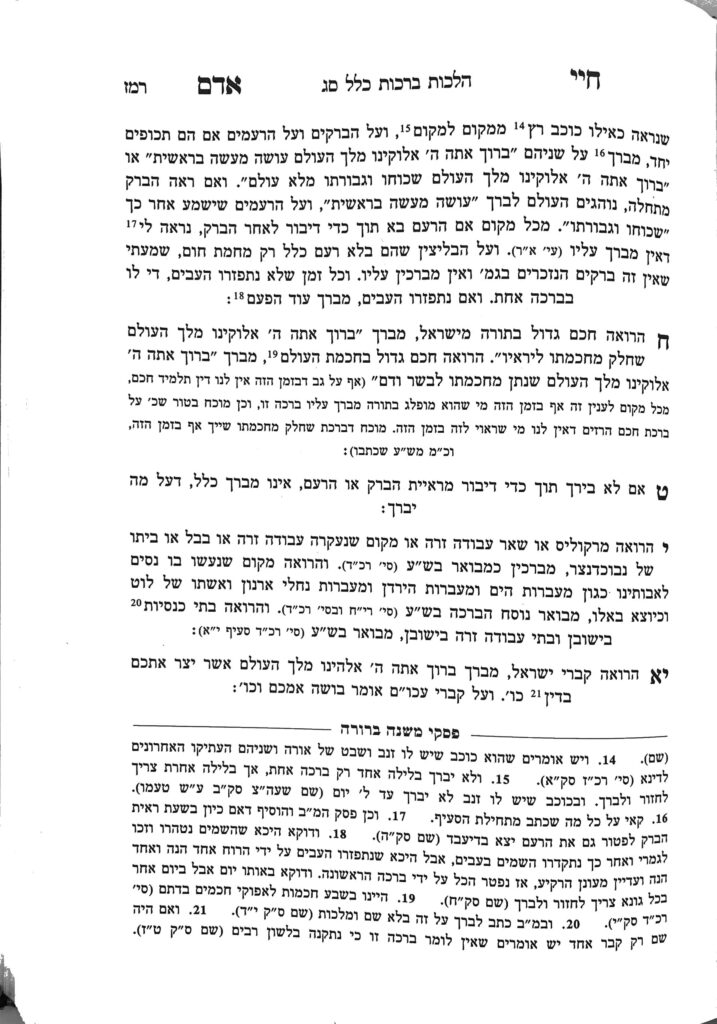We are continuing in siman 7. In the previous shiur, we learned that the proper time to recite the bracha on thunder or lightning is toch kdei dibbur of the occurrence, and if the thunder and lightning occur toch kdei dibbur of each other, one bracha covers them both. The Mishnah Berurah adds that bedieved, if one saw lightning and had in mind that their bracha on the lightning should cover the thunder as well, one bracha covers them both. The Mishnah Berurah is including even when the thunder was not toch kdei dibbur of the lightning, and even when the bracha was made before the thunder occurred.
Lightning which occurs without thunder, which is colloquially known as heat lightning, does not receive a bracha. (The term heat lightning is a misnomer, because these are simply storms which are too far away for the sound of the thunder to travel.) The Mishnah Berurah concurs, but the Chazon Ish disagrees, because it is regular lightning, and holds one does make a bracha. The Chayei Adam and Mishnah Berurah hold that one does not make a bracha, because the Gemara which discusses these brachos appears to be referring to thunder and lightning which come together. Due to the safeik, one should not make the bracha
The bracha on thunder and lightning does not have a 30 day rule. However, one only makes the bracha once per storm, as their bracha is motzi all occurrences during that storm. If the clouds have dispersed because the storm has ended (and not because the wind forced them to part), one can make the bracha on a subsequent storm, even on the same day.
If a storm carries over from one day to the next, the Mishnah Berurah brings a Yerushalmi which holds that one makes a new bracha. The day, in our context, is defined by how a person functions; i.e., morning to night.
Regarding extraordinary winds, the poskim write that the winds in question must have a destructive force such that they are mefareik harim, they ‘destroy mountains’. Thus, tornadoes, hurricanes, cyclones, and even strong tropical storms would meet this criteria.
The Chayei Adam does not mention earthquakes, but the Gemara clearly states that one recites the bracha of oseh maaseh beraishis on an earthquake. One should make the bracha toch kdei dibbur of a tremor. It is not clear whether any tremor receives the bracha, or only a tremor which causes the ground to shake.
Even if one follows the Chayei Adam not to make a bracha on heat lightning, they do not need to wait for the thunder to ensure that they can make the first bracha. Rather, as long as it is clear that the thunder will come (i.e., it is clearly a storm), one should make the bracha on the lightning toch kdei dibbur of its first occurrence, and should not wait for the thunder.
In order to make a bracha on lightning, there is an opinion that one must see the actual streak of the bolt. However, our minhag is to make the bracha even just as a result of seeing the illumination generated by the lightning bolt.
Summary
- The bracha of oseh maaseh beraishis is made on thunder and lightning when occurring simultaneously
- If thunder and lightning do not occur simultaneously, oseh maaseh beraishis is recited on the lighting, and shekocho ugvuraso malei olam is recited on the thunder.
- These brachos should be made toch kdei dibbur (approximately 1.3 seconds) of the occurrence. If one has in mind to cover the thunder with the bracha they made on the lightning, they are yotzei bedieved.
- The bracha can be made once per storm. If a storm continues overnight, one can make a new bracha the next morning.
- Due to a safeik, one should not make a bracha on heat lightning.
- Our minhag is to make a bracha on lightning even without seeing the bolt, but as long as one sees the bolt’s illumination.
- In order for extraordinary winds to receive a bracha, they must be of destructive force. Tornadoes, hurricanes, cyclones, and even strong tropical storms all meet this criteria.
- Oseh maaseh beraishis is recited on earthquakes. It should be recited within toch kdei dibbur of a tremor.



